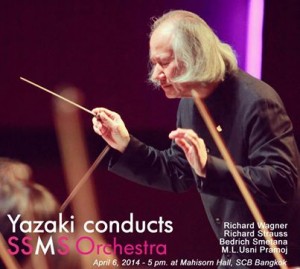AN EXPERIENCE OF A LIFETIME
AN EXPERIENCE OF A LIFETIME
CHETANA NAGAVAJARA
I never knew that a youth orchestra could play like THAT. I never expected any conductor could make a non-Western youth orchestra play like THAT after a summer school lasting only one week. I don’t often indulge in superlatives, but I am prepared to stick my neck out and say, “Maestro Yazaki is better than all those conductors I have experienced in Europe and America these past few decades.” How come that none of those reputable orchestras in the West has engaged him as its chief conductor? He was Ozawa’s assistant many years ago, and he is now definitely of the calibre of his elder compatriot. Let’s not talk about the Bangkok Symphony Orchestra that parted company with him after 10 years. It was not strictly a management problem, but perhaps a problem of musical insensitivity.
I am talking about the concert of the Silpakorn Summer Music School Orchestra at Mahisorn Hall, Siam Commercial Bank, which ended just a few hours ago today (April 6, 2014).
Today is Chakri Day, and H.E. Momluang Usni Pramoj composed a celebratory piece called “Chakri Day” for the youth orchestra. Instead of pomp and circumstance, we were treated to what I would call, “the epitome of the Ranad Thum Culture”, so subtle in its profession of faith in unassuming authority marked by simplicity and vivacity. What a contrast to the paroxysm of our current political life! Maestro Yazaki and the orchestra carried the message through with joy as well as confidence.
The programme began with Wagner’s “Prelude to Die Meistersinger”, a feat of contrapuntal complexity that straightaway convinced the audience that there would be other great things to come. I was struck by the richness of the sound of this youth orchestra as well. Of course, some sections had to be led by their teachers and tutors, but the youngsters responded with sensitivity to the conductor’s promptings. It was instructive to watch Yazaki ‘s conducting: the alternating between the attention to details and the guidance given to the entire orchestra was infallible. The Wagner Prelude was a good test piece: I had seen conductors wallow in details and thereby sacrifice the overall momentum. Not Yazaki. And only after one week, the young musicians learned how to establish a perfect rapport with the conductor. How many conductors can do that with an amateur or youth orchestra?
This concert has proved an important point related to the fate of Western music in Thailand. We tend to treat those school marching bands as a domain remote from classical music. That is a misconception. Extremely good wind players cross over from marching bands to chamber ensembles and symphony orchestras all the time. French horn players had a grand time today. Thossaporn Sombat performed Horn Concerto No. 1 by Richard Strauss with finesse as well as gusto. He more or less brought the house down, so to speak. After the interval, the horn players distinghuished themselves in a grand manner, both onstage and offstage, in Strauss’s “Till Eulenspiegel”, a fiendishly difficult piece that I had not thought a youth orchestra could bring off. But I had underestimated these young talents: there was no weak section or department in this orchestra. The strings used to be our headache, but no more. The joy of music-making onstage was contagious, and we in the audience readily became part of that musical communion. Of course, the youngsters succeeded in inspiring us, but I did sense that they could feel our presence that spurrred them on to such unusual artistic heights.
Talking about the overall quality of the orchestra, Smetana’s “The Moldau” that began the second half of the concert put us at ease from the very first moment. There was very fine woodwind playing right from the start, and when the strings entered, we knew that this orchestra had been well rehearsed. The size of the orchestra (with 12 double basses that could put the Viennese New Year’s Concert to shame!) accounted for the richness of tone. Maestro Yazaki knew how to draw a variety of tone colours from the orchestra and at the same time achieve a perfect balance of all the instrumental sections. The piece turned out to be extremely captivating.
So the Hong Thaew Conservatory of Taling Chan did it again for the 10th time. Perhaps the humility of their faculty members endeared them to colleagues, both at home and abroad, who came to help them. Among the tutors were musicians with international experience, and Maestro Yazaki has been more than happy to join them. But what after this? How can these highly talented youngsters continue to get together and make music without having to wait another entire year? The Hong Thaew Conservatory cannot go it alone. Who is willing to help them and how?
